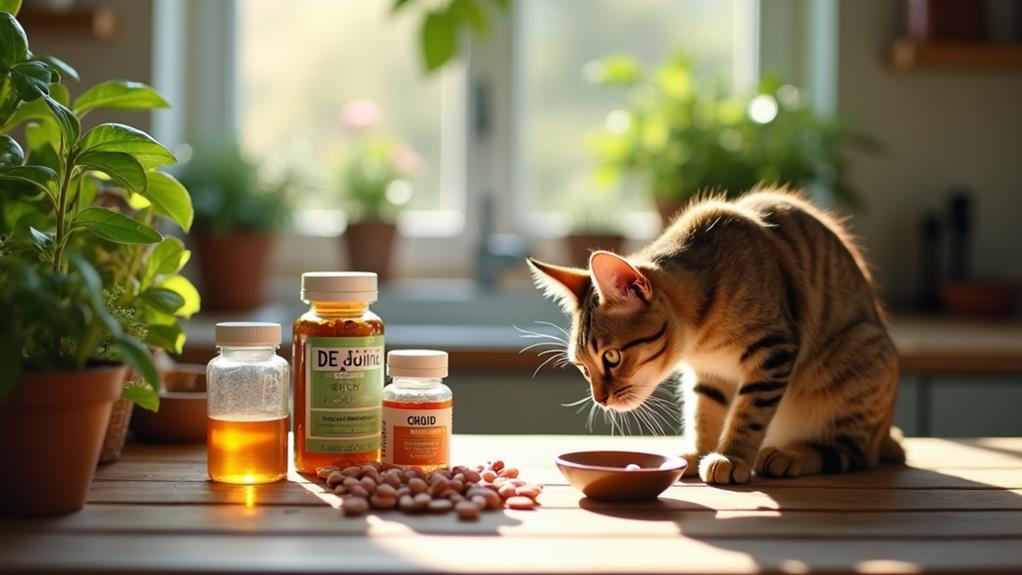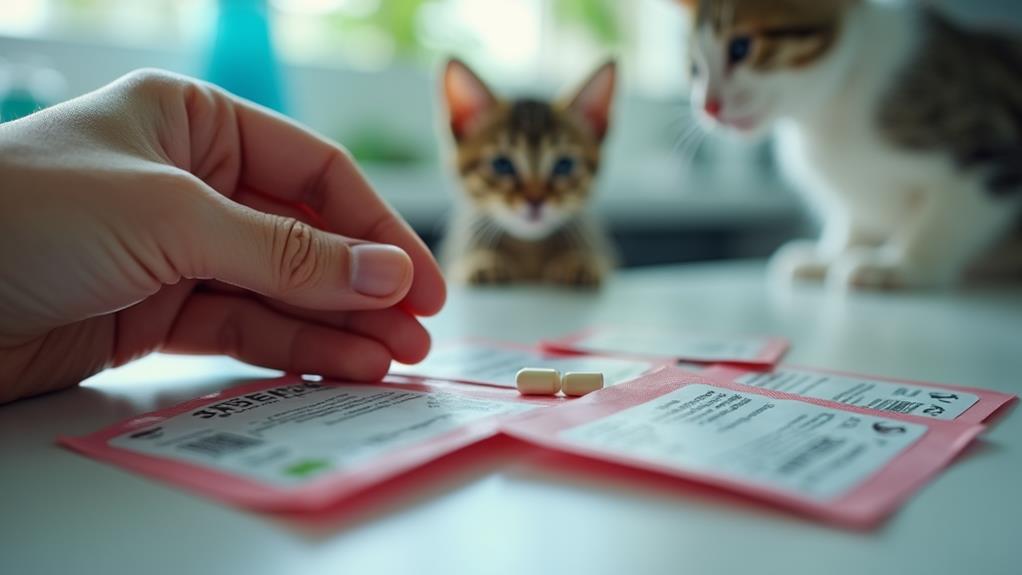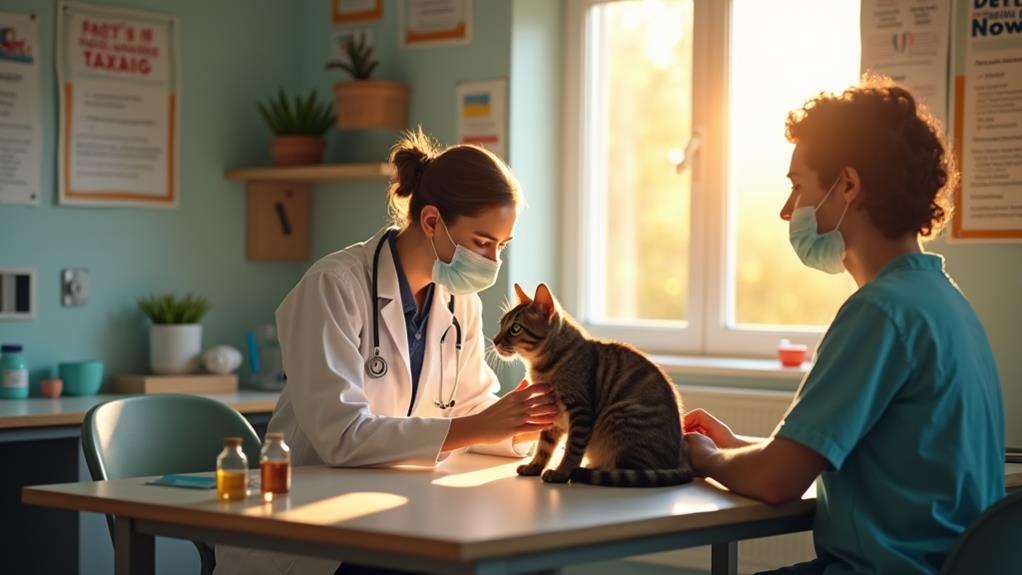What Can I Give a Feral Cat for Worms? Safe Deworming Options

For treating feral cats with worms, you can use medications like Panacur (fenbendazole), Pyrantel pamoate, and Praziquantel. Verify you calculate the right dosage for the average cat, typically around 8 pounds, and mix the medication with food or milk for easy ingestion. Regularly monitor the cat after treatment and consult a vet to guarantee effective and safe administration. These dewormers address common parasites like roundworms, hookworms, and tapeworms. Maintaining a consistent deworming schedule every three weeks initially, then quarterly, is vital for long-term health. Uncover supplementary tips for fostering healthier feral cats and managing worm infestations effectively.
Importance of Deworming Feral Cats
Deworming feral cats is fundamental because parasites can wreak havoc on their health, leading to severe nutritional depletion and weakened immune systems. When you deworm feral cats, you help them fend off these invisible threats, improving their general health and potentially extending their lifespan beyond the typical 2-5 years. Regular deworming is critical, as it guarantees that these feline wanderers maintain their strength and are less susceptible to infections that could easily take hold in a compromised body.
You may notice signs of worm infestation, like rough coats and weight loss, which are clear indicators that immediate deworming intervention is needed. It's significant to treat the entire colony, as leaving some cats untreated can result in reinfestation, undoing your efforts. This collective approach is imperative for the health of the entire feral cat community.
Consultation with a veterinarian is a key step. They can guide you in selecting the right deworming products and help establish a treatment schedule tailored to the specific needs of the feral cat population. By committing to regular deworming, you're taking a substantial step towards guaranteeing a healthier future for these cats.
Identifying Common Cat Worms
When caring for feral cats, understanding the types of worms that commonly affect them is vital. Feral cats are often exposed to a range of parasites, with worms being a major concern. Among the common types, roundworms, hookworms, tapeworms, whipworms, and lungworms frequently invade their systems.
Roundworms, particularly of the Toxocara species, can be found in a staggering 25% to 75% of cats. They may cause symptoms like vomiting, diarrhea, and a pot-bellied appearance. Hookworms, though less prevalent, are dangerous parasites that can lead to anemia, evident by black tarry stools and a poor coat condition.
Tapeworms, most often Dipylidium caninum, are especially tricky because they're linked to flea infestations. You'll notice rice-like segments near the cat's anus, which are telltale signs. Effective flea control is critical to prevent reinfestation.
Whipworms and lungworms can also cause significant issues, such as diarrhea, weight loss, and respiratory problems. If you spot any symptoms, a prompt veterinary evaluation is necessary for appropriate treatment. Being vigilant about these worms can help you manage and support the health of feral cats in your care.
Recommended Deworming Medications

Several effective medications are available to safely deworm feral cats, helping them live healthier lives. Panacur (fenbendazole) is a popular choice among feral cat colonies. It addresses roundworms, hookworms, tapeworms, and giardia, making it a thorough option. Administer it for three consecutive days at a dosage of 50 mg per kg of body weight to guarantee effectiveness.
Pyrantel pamoate is another reliable dewormer, targeting roundworms and hookworms. You should dose it between 2.5 to 10 mg per pound, depending on how severe the infestation is. This medication is especially useful in managing the health of feral cat colonies, where infestations can spread quickly.
For tapeworms, Praziquantel is the go-to medication. However, it only treats tapeworms, so you'll need a veterinarian's guidance to determine the best course of treatment based on the specific worm infestation present.
When you're using milk replacers to administer these medications, verify you calculate the correct dosage based on the average weight of feral cats, typically around 8 pounds. Always consult with a veterinarian to tailor the treatment to the cats' specific needs, guaranteeing their well-being and the health of the colony.
Administering Dewormers Safely
Getting started with administering dewormers safely involves a few key steps. To begin, always consult a veterinarian to make certain you're choosing the right dewormer for the specific type of worms affecting the feral cat. This step is vital because different types of worms require different treatments, and using the wrong one could be ineffective or harmful.
One recommended dewormer is Panacur™ (fenbendazole), which effectively tackles roundworms and hookworms. It's also considered low-risk for overdose, making it a safer choice for feral cats. When it's time to administer the dewormer, mix it with a palatable food or milk replacer. This approach encourages the feral cat to consume the full dose, guaranteeing the deworming process is effective.
After you've administered the dewormer, keep a close eye on the feral cat for any adverse reactions. If you notice any concerning symptoms, reach out to a veterinarian immediately. Remember, deworming isn't a one-time task. At the outset, repeat the process every three weeks to tackle existing worm populations. After that, maintain control with quarterly treatments. These steps help guarantee the deworming process is both safe and effective for the feral cat.
Alternative Deworming Methods

Exploring alternative deworming methods can improve your approach to managing feral cat populations effectively. By considering options beyond traditional oral pills, you can address the challenges of administering medication to these elusive animals. One such method is food-based administration. Mixing deworming medications like Panacur (fenbendazole) with food can disguise the taste, making it easier for feral cats to consume the treatment without hesitation. This approach is particularly useful in controlling tapeworms and other parasites.
Another effective alternative is topical treatments. Products like Drontal Spot-On and Profender can be applied directly to the skin. This is a great option if you're dealing with cats that resist taking oral medications. These treatments are absorbed through the skin, providing a convenient way to administer dewormers without the need for direct contact.
It's also vital to collaborate with veterinarians. Their expertise helps you select suitable over-the-counter products and determine the best administration method for targeting specific worms. Moreover, following a repeat treatment protocol every three weeks and quarterly guarantees thorough control of worm populations. Engaging with local TNR programs can facilitate access to these treatments, promoting healthier feral cat colonies.
Role of Milk in Deworming
In the context of administering deworming medications to feral cats, incorporating milk replacers can be an effective strategy. Using milk replacer as a medium guarantees that feral cats ingest the medication, especially when you mix it with a bit of unmedicated milk initially to build trust. This method is particularly beneficial for kittens, as mixing deworming products with milk replacer improves their consumption, making certain they get the needed treatment.
It's vital to deworm feral cats regularly to maintain their health. The average feral cat weighs around 8 pounds, so accurately calculating the medication dosage is essential. Here are a few tips to improve the effectiveness of using milk replacers in deworming:
- Begin by offering unmedicated milk: This builds trust and familiarity.
- Accurate dosage calculation: Guarantee the right amount of medication for an 8-pound cat.
- Follow a deworming schedule: Repeat every three weeks initially, then quarterly.
- Monitor post-treatment: Check that all cats receive treatment and monitor effectiveness.
- Use for kittens: Mixing with milk replacer guarantees they consume the medication.
Veterinary Consultation Benefits

Consulting a veterinarian provides numerous benefits when deworming feral cats. Primarily, a veterinary consultation guarantees an accurate diagnosis of the specific type of worms affecting the feral cat. This accuracy is vital because treating the wrong type of worms can lead to prolonged health issues or ineffective treatment. With a vet's expertise, you'll receive recommendations for the appropriate deworming medications tailored to the cat's weight, health status, and the common parasites in your area.
Moreover, professional guidance from a vet helps you establish a safe and effective deworming schedule. This is particularly significant for kittens or immunocompromised cats, who may require special attention and dosage adjustments. A veterinarian doesn't just stop at deworming; they can also conduct further health assessments and administer vaccinations. This thorough approach helps address other potential health concerns, contributing to the overall well-being of the feral cat.
Managing Parasites in Colonies
When managing parasites in feral cat colonies, treating all cats at once is crucial to prevent reinfestation and achieve effective results. Regular monitoring and implementing a deworming protocol every three weeks, followed by quarterly treatments, will help maintain the colony's health. This approach guarantees every cat is free from parasites and reduces the risk of spreading them within the group.
To effectively manage parasites in your cat colony, consider these strategies:
- Simultaneous Treatment: Confirm all cats receive treatment at the same time to prevent any from being a source of reinfestation.
- Pre-Treatment for Newcomers: Introduce new cats only after they've been pre-treated to avoid bringing new parasites into the colony.
- Regular Monitoring: Keep an eye on the colony's health and repeat treatments as necessary to combat any resurgence of parasites.
- Veterinary Collaboration: Work closely with veterinary professionals to tailor a thorough parasite management plan.
- Medication Administration: Use milk replacers mixed with deworming medication, which aids in administration and builds trust among the cats.
Preventing Future Infestations

Prevention is the foundation of maintaining a healthy feral cat colony. Regular deworming schedules are vital for preventing future infestations. Adult feral cats should be treated every 1-3 months, while kittens require deworming every two weeks until they reach six months. This routine keeps worm infestations at bay and guarantees the cats' health and well-being.
Maintaining cleanliness in living areas is another significant factor in preventing infestations. Clean areas reduce the risk of worm transmission and outbreaks. Regularly cleaning feeding sites and monitoring any waste helps eliminate potential breeding grounds for parasites. Implementing effective flea control is similarly essential, as fleas are notorious for transmitting tapeworms. Topical flea preventatives work best for Community Cats, providing a practical solution.
Monitoring litter boxes for signs of worms or abnormalities in feces allows you to detect issues early and treat them promptly. Quick intervention prevents the situation from escalating. Educating community members about the signs of worm infestations improves awareness. When more people know what to look for, it fosters timely intervention, aiding in the comprehensive health of feral cat populations. With these strategies, you can help protect Community Cats from future infestations.
Community Support and Resources
In the domain of feral cat care, community support is invaluable for ensuring these animals receive the necessary treatments, including deworming. Community involvement is vital for identifying feral cat colonies and making sure all cats benefit from medical care. Local animal shelters and organizations depend heavily on volunteers to carry out TNR (Trap-Neuter-Release) programs, effectively managing cat populations and minimizing health hazards. Many communities offer important resources for spaying/neutering and deworming, which greatly improve the health and lifespan of these cats.
To assist you in your efforts, consider the following resources:
- Local Animal Shelters: They often run TNR programs and provide deworming treatments.
- Veterinary Clinics: Many offer consultations and support on proper deworming techniques.
- Animal Welfare Organizations: These groups may provide free or discounted medications and treatment plans.
- Public Awareness Campaigns: These initiatives can educate residents about the importance of deworming, reducing parasite prevalence.
- Volunteer Networks: Join forces with others in your community to share knowledge and resources.




